|
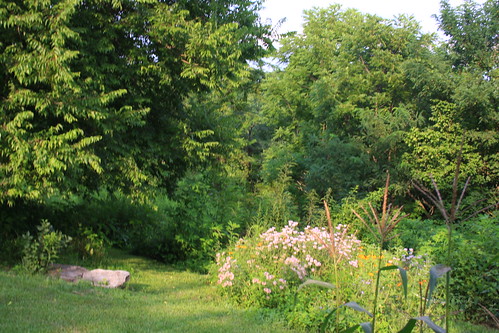
Early August backyard gardens.
(*photo credit)
August 1, 2011
Celebrating Green as the Color of August
Green
is my favorite color, and so 32 previous reflections have green in their titles
(more references than to all other colors combined). Green occurs always in a
positive light, and mostly pertaining to environmental buildings (hospitals or
churches), practices (organic gardening or conferences), materials (gifts or
collectibles), areas (cemeteries or tourist sites), and food "greens" (spring or
autumn). Interestingly, no titles refers in a pejorative manner to complexion
(green with envy), inexperience, or condition of spoiled food. I recall that
once on St. Patrick's Day in New York all the food in our dining place was dyed
green -- but the food was unappetizing and went uneaten.
Travelers
returning from the vast West with its open skies and wonderful mountains,
plains, canyons, and rock formations mentioned how great it is to get to our
Midwest, because the landscape east of the Mississippi is quite green at this
time of year. We who live here take this coverage of verdant foliage for
granted, for we know that this is a comforting mantle. The tree cover has many
advantages (see May 16, "We Need Trees for Many Reasons").
Green is the color that
psychologists tell us is the most soothing for the human eye -- no telling how
it strikes other creatures. Green gives us comfort in ways that are not
rationally explained, but chalk it up to personal experience. I know there is a
feeling of exuberance when, about the beginning of May, our entire landscape
goes from the brown of winter to that fresh coating of green once all tree
leaves appear. Actually, with climate change, the phenomenon occurs in recent
years nearer to mid-April. Also, in mid-autumn, the tree foliage turns color,
and then the naked trees appear about November first in our deciduous forested
regions. We are blessed with a green half year.
"High
green" is our Kentucky landscape in August -- and really even that
designation will fade after mid-month. The fields of soybeans and corn are in
the height of greenery, but these will turn to golden in a matter of weeks. The
pastures and the hayfields contain their second cutting coming in this season as
well as vegetables in the gardens (melons, tomatoes, and others). Shades of
green are all about and, like blooming flowers, they last and turn so quickly --
and that is always what makes the landscape so treasured. In a little while the
shades of autumn will appear, just as brilliant and colorful and even more
transitory.
We
can detect the "aging of the green" already in forests, for some of the shades
have that mellow yellow appearance. The sycamores are starting to lose their
leaves and the black locust leaves are drying up as well. The sour gum gives us
that signal that changes are in order. We prepare for what is to come.
Prayer:
Lord, help us to see that colors confer meaning and the sign of life; direct
our minds through color to eternal life.
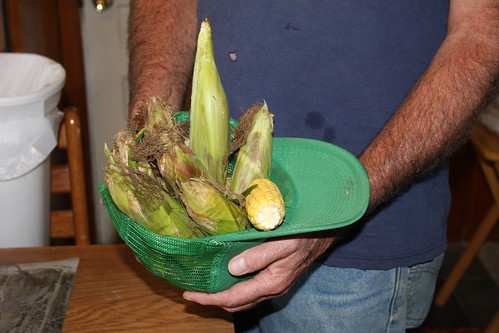
Kentucky farmer gathers fresh organic corn.
(*photo credit)August 2, 2011 Living
Within One's Means
This was first written on May
13th when U.S. national debt default technically occurred. For the past few
months there have been raids on the American piggy banks to keep the obligations
met for all parties. We are all aware that Congress did some political
one-upmanship. We have started to ask, "Is default such a disaster, if it is a
lesson to teach us to live within our means?" How can any of us, individual
citizens or governments, pretend to be acting responsibly by playing around with
only raising 57 cents for every dollar spent? Do we really have control over
our lives? The country's debt reflects the collective individual practices of a
people who do not abide by a conservationist ethic, nor refrain from a variety
of unsustainable practices ranging from excessive military expenditures to
failure to tax the rich. Ours is a land addicted to indebtedness and ignoring
the consequences. A material collapse is a small price to pay for a spiritual
reawakening.
First, our country is one of
the most wasteful in history. See the mountains of garbage rising near New
York, Chicago, and other areas that salve consciences by collecting some of the
escaping methane in the decomposition process, and think that they are not
being wasteful. By wasting we do not appreciate God's gifts to us. Wasting
desensitizes us to that respect for all of God's gifts that we need to always
bear in mind.
Secondly, we actually believe
that indebtedness will be paid off easily through some unknown manner. We allow
our lives to be run on fiction, for the coming rainy day is always put off until
beyond our mortal lives. Too many military and foreign wars; too many medical
treatments that are unneeded; too much untaxed wealth and luxury spending
unaccounted for; and too much false or misleading advertisements. No complete
sentences? No, this is a complete sentencing of false ways of life that are
unsustainable and leading to an unhappy ending.
Thirdly,
living within our means has always been practiced by some, but not all.
Tolerance for excesses is losing credibility. The rights of the commons must be
respected. We need a new sensitivity for our wounded world. Our citizens are
called to --
*
Travel less by auto and do so in efficient vehicles;
*
Eat food locally-produced and less resource-intensive;
* Give to the poor, waste
less, and recycle more;
*
Heat and cool space more moderately and healthily;
*
Live in smaller homes and convert lawns to edible landscape;
*
Insist on fair taxes for the wealthy;
* Stop the bleeding of jobs
to distant locations;
*
Halt advertisements for prescription drugs; and
*
Budget what we have, and live by it.
Prayer:
Lord, assist us when we recklessly create our disasters to learn from them,
and discover a spiritual reawakening that is necessary for our health and
welfare.

Meadow fritilaries (Boloria bellona) on Itea
virginica shrub.
(*photo by Sally Ramsdell)
August 3, 2011
Reflecting on Physical and Spiritual Journeys
As
the vacation season winds down and we end our annual extra physical travel, we
need to take stock. A physical journey can change us for better or worse, and
in asking pardon for mistakes, we ought to count benefits -- for new
acquaintances, experiences, scenes, and acquired virtues. In these reflections
we have mentioned in the past six years a variety of journeys: St. Luke's
Gospel, Emmaus episode, formal pilgrimages, Palm Sunday, and personal on tobacco
and food. Furthermore journeying can include writing, planning, hiking, and
engaging in a labyrinth.
Journeys
are by the derivative of the word something that takes effort, and so a journey
(especially as we age) is something that is not taken lightly. We plan ahead
and we engage ourselves fully while we travel. A variety of relationships are
established, new scenes come to us (thus some reason for photography), we gather
souvenirs, and we take daily notes that will bring back memories. Afterwards we
express gratitude to hosts and hostesses who went out of their way to make these
happy events. Journeys can be higher points in ordinary life.
Physical
journeys are now taken with greater foresight because fuel prices rise,
travel conditions are congested, lodging is a challenge, and nerves can become
short. When we opt for public transportation, there are airport parking,
searches, late planes, and unexpected difficulties in carrying all items allowed
by security. Of course, there are the gifts to take and maybe those to bring
back for others. The weather and travel conditions are always factors to weigh,
and even the red alerts of terrorists, volcanoes, and weather conditions in
which we must contend.
Spiritual
journeys could be put in the singular, for we each have a special calling.
My journey of faith is similar to and yet profoundly different from others --
and that makes each of us unique persons. Differences are obvious when we
listen to others' stories, for each has a special flavor as though our
particular relationship to God contains its own personhood. Similarity includes
all having beginnings at birth and endings at death. Our spiritual journeys
need the road maps of life through commandments and Scriptures, along with
energy through sacraments to ease pain, avoid spills, and correct detours.
The characteristics of
pilgrims on a formal, once-in-a-life journey (persistence, trust in God,
attention to road conditions, quest for good companionship, prayerful attitude,
and sense of shortness of life) are integral to our entire journey of faith.
However, the attention needed at the very destination that is often so tricky
during physical journeys is left to God, who prepares us for a new journey where
faith is transformed into eternal love.
Prayer:
Lord, give us the grace to discover you in our travels and, in reflection upon
each of them, permit us to have a clearer anticipation of what lies ahead.
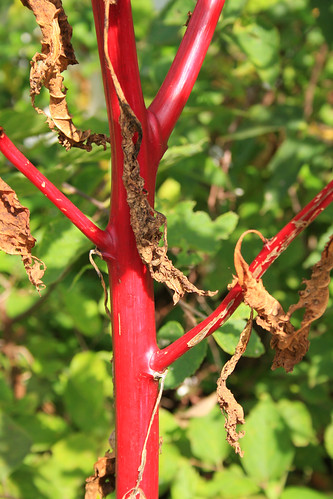
Red stalks of poke plant.
(*photo credit)August 4, 2011
Nationalizing with Caution and Care
Some people do not like the
sound of "nationalization" whether in respect to utilities, railroads,
manufacturing, or financial operations. The banking crisis due to sub-prime
mortgage rates in 2007 and the banking and housing mess unraveling in 2008-09
raised questions about nationalization of lending institutions and banks -- a
plague for many fiscal conservatives. However, an immense privatized and
unregulated system was able to create a massive global disturbance, and
governments seemed powerless to stop it. These governments admittedly lacked
procedures and regulations to handle multinational banking organizations with
operations beyond a given nation's boundaries.
The
blame for such financial misdeeds went far beyond lack of governmental
regulations: banks and lenders with high-salaried executives; rating agencies
failing at their designated tasks; Ponzi schemes running into billions of
dollars; and overextended credit on the part of borrowers who lacked ability to
repay or failed to read adjustable mortgage rates that soon got out of hand.
Along with deflated housing values, the bubble burst, equity evaporated, unpaid
mortgages went "under water," and some walked away from debts or were evicted
from homes during foreclosures. The banks and auto manufacturers came with
outstretched hands (some via private jets) to the federal government for
bail-outs. Panicky treasury officials threw billions of dollars to save these
organizations through temporary "nationalization" though seldom using the
term.
Nationalization
advocates point as a success to Costa Rica that nationalized utilities,
railroads, insurance, and banks. This is one of the smallest of the Western
Hemisphere's republics with no military and a higher standard of living than its
immediate neighbors. However, many countries have moved away from centralized
planning and nationalizing ventures for a variety of reasons, and prefer to opt
for the free (unregulated) market system that is not really free.
The
principle of subsidiarity holds that operations should be conducted at the
lowest level possible, and often that is lower than the national level.
Domestic practices ought to trump localized or regionalized ones. Local
ownership ought to be better when it comes to things from newspapers to local
food-producing farms and gardens; local, regional and national highways should
exist along with seaways open to international trade. Large-scale governments
can become bureaucratically stagnant and large-scale private operations greedy.
Largeness, public or private, has limitations and thus must be transparent. How
could we have a safe environment where regulations prevail and the vast commons
is protected without recourse to higher levels of governance?
Prayer:
Lord, make us political and yet not partisan, righteously angry and yet
merciful, involved and yet with eyes focused on a just and fruitful horizon.
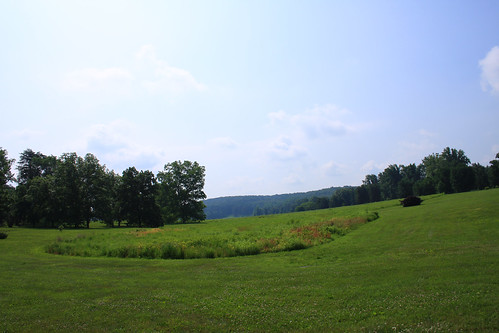
Wildflower garden in early August.
(*photo credit)August 5, 2011
Preparing for Autumn Garden
Today
is high summer; autumn is as much in time ahead as spring is behind us. It's a
perfect day to plan for an autumn garden. If protected, many fall vegetables
can carry one well into next spring with crops that survive the winter --
garlic, onions, carrots, turnips, parsley, spinach, kale, arugula, and mustard
-- all this spring's survivors in my garden from 2010. Note a number of other
vegetables were omitted mainly for lack of seed. There was even an unknown
lettuce -- it made an excellent salad on a May 1st potluck in honor of the John
Paul II beatification. Don't let fair-weather-summer gardeners discourage you.
Autumn, at least in our milder temperate climate, is excellent for gardening
that can extend well into the next calendar year.
Choice.
Many plants grow in the fall. Choose one that is your favorite (e.g., endive),
and give it extra loving care in a choice location where protection from the
wind is maximized.
*
Preparation. Soak seeds before sowing, and water well in late summer.
Sow early enough to have full growth started before frost, and yet late enough
not to burn out in the hot dry weather (usually from August 15 to September
15th). It takes as much luck as proper choice. While in springtime we may sow
in rows to minimize cultivation and protection against weeds, the autumn seeds
can be "broadcast" or sowed over the entire surface areas.
*
Variety. Try some new autumn entries. Do not neglect to sow variety,
some for fall harvest and some that can last through the winter. Make this a
season of simple "messes" of many salad greens, for autumn is truly salad time
(we find springs are too short-lived for some salad greens, and they often go to
seed in the heat of late May or early June). Choose some Brassica members
(kale, Brussels sprouts, broccoli, etc,). Omit summer hot-weather cucumbers,
beans, peppers, and tomatoes.
*
Protection. Better yields can occur through use of Remay or other
protective covering. On sunny days remove plastic coverings to allow the autumn
crops to air out, but cover at night.
*
Mulching. This is not as needed as with spring crops beset by weeds.
However, a light covering of dried grass, crushed leaves, or other light
materials could prove protective.
*
Watering. Most cooler weather growing spans do not need watering once
beyond the critical growing period of germination and early growth. For small
gardens, a rain barrel is sufficient to cover moisture needs.
*
Omit flowers as planted in spring and summer though mums do well, as do
goldenrod and asters. The greenery of the growing veggies is color enough for
me.
Prayer:
Teach us, Lord, to prepare always for what is ahead.
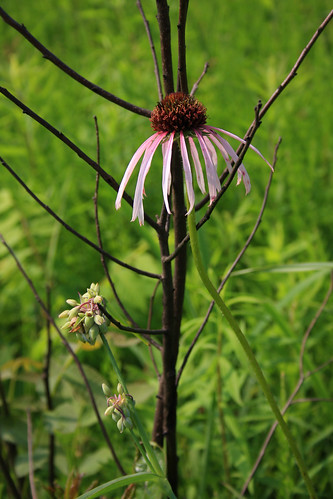
Purple coneflower, Echinacea purpurea.
(*photo credit)August 6, 2011
No Fukushima in New Mexico!
In
the half year since the disastrous earthquake in Japan and the serious damage to
nearby nuclear powerplants, the rest of the world has wondered how to prepare
for such possible occurrences in their own countries. Germany, Switzerland, and
Italy have started to step back from nuclear power generation all together.
Other countries are having second thoughts and the U.S. is soul-searching as
well, even beyond powerplants as such. Pax Christi has focused on the
proposed Chemistry and Metallurgy Research Replacement (CMRR) Project at Los
Alamos, New Mexico.
The
original CMRR to be completed this year was projected to cost $400-550 million.
The current estimates according to the FY2012 budget to be completed in 2023 is
$5.8 billion, ten times original estimates -- and perhaps with more overruns
ahead.
Costs
are one thing. The worse part of the project, as taken from the Pax Christi
report, is that the new CMRR plant is being built 2/3s of a mile (1
kilometer) from a geologic fault line. The Los Alamos National
Laboratory (LANL) is located in a seismic fault zone between a rift valley and a
dormant volcano. An updated seismic hazards analysis from May 2007 showed a
potential huge increase in seismic ground motion and activity. In all
likelihood, most of the more than $3 billion added to cost estimates since 2008
result from efforts to address the heightened seismic hazards. The costs of
adding this enormous new facility to LANL's weapons manufacturing complex in a
geologically unstable area are just too great.
Our
country is not taking the same precautions on nuclear safety issues as some of
our allies. Do we just continue as though it is worth the risk for a repeat of
Chernobyl or Fukushima?
Of course the risk question could
be extended. An added Pax Christ note: Is the nuclear weapons work presently
done at LANL and our other nuclear weapons facilities violating the Nuclear
Non-Proliferation Treaty? Thus, recklessness could be compounded by actions
going against international treaty considerations.
Our
American concern must include a number of other factors that are also coming to
light. Many of America's one hundred plus nuclear powerplants lack full
security measures; they have holding tanks that could be vulnerable to attack
-- a point we are reluctant to mention due to planting ideas in the minds of
terrorists. Furthermore, several of the powerplants are located within
earthquake-prone areas and may be subject to such unfortunate events. Are New
Mexico or California or other states due such a March, 2011-Japanese-style
disaster?
See Pax Christi website or
contact <johnny pcusa@yahoo.com>.
Prayer:
Lord, teach us when we make mistakes not to compound them, but to own up to them
and take proper corrective measures rather than to act recklessly.
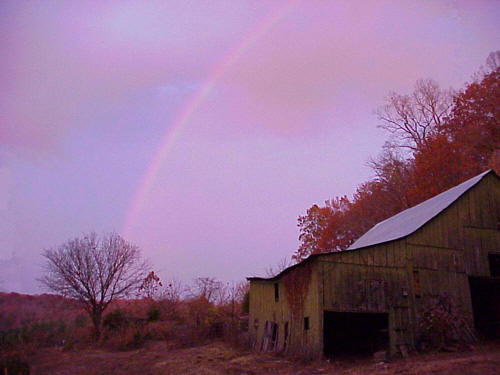
Celebrating the wonders of a rainbow.
(*Photo by Sally Ramsdell)
August 7, 2011
Living with the Storms of Insecurity
I remember a mid-summer
storm. We had the blessed candle flickering as our only light because
electricity went out. Darkness enveloped us and we listened to the howling wind
and blinked at the blinding flashes of lightning. Then the hail started
falling, and it hit the galvanized roof of the house with a roar -- and inside
all was silent, for we knew the crops were being destroyed. It was a "great
silence" in the middle of a storm, for crop yields and our livelihood were
threatened.
Peter sees Jesus walking on
the water and seeks security himself, because a storm at sea can make seafarers
helpless as well. At the sight of Jesus, Peter jumps out of the boat and soon
finds himself sinking after seeking to imitate the one walking on the waters.
Fear of the storm and fear of drowning combine in one act. Where will it all
end? Peter's life passed before him in a flash as can occur in such
circumstances.
How will each of our storms
of life end? We need protection, for our future is as uncertain as the
battering hail episode or the storm at sea for Peter. We are people adrift and
many things can happen before the storms of our lives end. Someone recently
predicted by the U.S. would become a second-rate power by 2016 caused by
financial, military and social turmoil of various sorts. Maybe so; maybe not.
What about the litany of health problems that may await each of us? What about
our families and how they will fare in relationships with others, some of which
seem far more uncertain than others?
Many things can frighten us
in the storms we have at this time, and fears differ with individuals and each
person's imagination. As for the Church, we need only look back in history and
find other storms, which were massive and yet, with the grace of God, were
endured, and the Christian community continued to grow. The journey of faith is
always perilous and contains frightful moments in every age.
Jesus tells us to focus
upon him as savior, and put our trust in him. If our faith is deep enough,
storms that confront us can be endured, and the new day will bring the bright
sunlight of peace. When the Lord is with us we will not sink, but be buoyed up
by his presence. Jesus asks each of us to look into our own faith. Oh, we of
little faith! With more faith, we can achieve more. The saints of old had
deep faith that God would protect them from their enemies. These models of
faith took hold of the Lord's hand and walked the distance of what seemed an
eternity between when they first saw, and when they accompanied him. We need to
rest assured that Jesus is always near.
Prayer: Lord, move us
to engage in looking out for the needs of all. Never let them feel forsaken in
the stormy darkness of this age. Strengthen our faith that Earth can be healed
and that we can convey this sense of hope to our associates.

Acrobatic young gray squirrel with onlooking indigo bunting.
(*photo by Sally Ramsdell)
August 8, 2011 Rowing as
Ideal Physical Exercise
We
like to promote the physical exercises that we find beneficial to our own
wellbeing -- and that is to be expected. Everyone needs to keep the body
functioning in balance, and some exercise does this better than other. In fact,
there are stretching and other exercises for those who must sit a long time, and
are unable to stand and move about. The point is to choose a particular
physical exercise that fits your time, age, sociability demands, budget, and
immediate environment.
For
over four decades I jogged, and so spoke up on occasion for that noble exercise
-- but older age and dangers from traffic and to fragile body parts dictated a
change to walking -- a practice of far less public adulation and pride. In
part, that is because hiking, strolling, or stepping miles or feet can be an
achievement for various people. Walking covers a variety of degrees from brisk
striding to limping along, but each is okay.
Rowing
a boat was always my favorite exercise, but I rarely had access to boats, ideal
bodies of water, and proper weather to achieve this. Jogging opportunities were
more available; roadways and jogging shoes were easier to procure than boats,
oars, and nearby waterways. Now for a daily workout, I undertake one half- hour
of stationary "rowing" along with one half-hour of walking (or gardening) as my
forms of obligatory physical exercise. I use a sturdy rowing machine (Concept
2) that, when oiled occasionally, does not wear out easily. Cheaper
varieties do. This is not meant to be an advertisement except that stationary
rowing is hard on machines, and many devices cannot take that much wear-and-tear
without overheating and burning out. This machine can be tightened or loosened
to the degree that one wants to pull on the handle bars and use both arm and leg
muscles with greater or lesser degrees of energy expenditure. The beauty of
rowing is that both arm and leg muscles are operative, not just arms as in
pushups or legs as in jogging.
This
type of exercise does not require electricity, as do some exercise machines; it
takes up some space because it is elongated, but also folds up easily and can be
moved about the house when rooms are needed for other uses. Another feature is
that it does not make annoying sounds like some noisy machines, but only a
gentle swishing sound that is not heard at a distance. Nor does this instrument
require excessive maintenance, though a little occasional oiling is required.
The instrument is relatively light weight and can be torn apart easily to be
trucked to a new location. Non-boat rowing has many advantages except change of
scenery and fresh air, that could be remedied by where located and the use of
radio or television to idle away the time. Choose well!
Prayer:
Lord, bestow on us the courage to keep up our health and to do so through a
proper choice of physical exercise. May we be faithful to the types chosen.
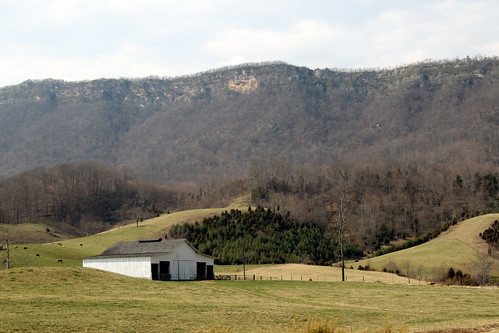
Rural barn near Middlesboro, KY.
(*photo credit) August 9, 2011
Harvesting Silage in August
Farming
has its happy memories that are precious many years after events of the past.
Non-agrarian people do not understand the underlying good feeling involved in
preparing provisions for people and livestock for the winter months ahead.
To harvest can be hard work and sometimes quite sweaty, but there can be happy
memories; "making silage" was one of them.
Early
in the morning of harvest day, we would go into the mixed corn/cane field and
cut a path so that the binder/cutter could follow and make corn bundles of green
potential silage. Wagons would carry these bundles to our silo, and then
the chopping began. (Most harvesting today has the chopping operation in the
field itself). The chopped corn/sorghum cane mix was blown into a silo,
and we younger kids were commissioned to keep the incoming chopped materials
somewhat tramped and level, removing extension pipes each in turn as the inside
filled over time. We would shout and yell to our hearts' content in the
middle of the noise, for the sound of the chopper/blower drowned out our glee.
We would climb up higher in the silo and make flying leaps into the soft silage.
At
the end of the operation when the silo was full, we would actually haul up a
load of dirt and seal the top so no spoilage would occur. Thereupon the
sugar-loaded silage would partly perk, and fermented cane juice would seep out
at the base of the silo. When hogs were in the area near the silo. they
soon would discover the seeping liquid, drink it and stagger away -- for it took
little to inebriate them -- and I wonder later if our laughter at the sight was
proper respect for dumb animals.
The
silage would remain partly fermented and in preparation for good winter feed for
hungry dairy cows. As late summer turned into the chill of autumn, and
then the cold of winter, the silo would be made ready by removing the protective
dirt layer, and the silage would be rationed out over the winter months.
The hungry animals would crowd to get ahead of the others to be first at the
trough for the energy- and nutrition-rich silage -- and when feeding near supper
time it made us hungry as well.
Turning materials into livestock feed is always a challenge for a hungry world.
The fact emerges that the leftovers from food or biofuel-processing could and is
used to feed milk- and meat-producing livestock. This changes the
calculations as to whether grain is consumed solely for fuel when turned into
alcohol to run the vast American vehicle fleet. Surely spent grain is a
healthy redirection of fuel to feed grain. Was not silage-making a process
of turning grain- and sugar-bearing crops into animal feed as well, though the
end results were dairy products?
Prayer:
Lord, enlighten us to use all resources properly in this hungry world.
Help us make proper decisions as to what to raise on limited grain-producing
lands, and to do so with the total global food security issue in mind.

Eumeces laticeps, broadhead skink under a dense tangle of grass.
(*photo credit)August 10, 2011
Connectedness: Creating a Balanced Practice
This
is an age of instant connections, of phones and emails of Twitter and Facebook,
of quick travel and fast food stops. In some ways, to be connected
overcomes the scourge of isolation; in other ways, connections invade the
privacy of our lives and limit our quality time. The challenge for us is
to minimize negative aspects that weaken social bonds and to improve the
positive ones.
Negatively, we certainly can be overly connected: when we need time to
rest and are chattering; when we need time to reflect and are bantering;
when we tend to personal needs and are not; when commercials disturb our meals
or conversations; when we need to study, worship, or plan and instead must
entertain those young or old who cling to us. "Leave me alone" is a common
plea of the rest-deprived, and it ought to be honored by all of us.
Positively,
we could be underconnected: when we have something important to tell; we have
forgotten the isolated ones in our lives; we need to reply to the open
invitation to participate in an event; we need information fast on a given
subject; we are inspired to add our comments to the conversation; and when we
need to commiserate at a special time.
Six
rules for a balanced social or connected life:
1)
Insist on private time (daily, weekly, monthly and yearly) when others cannot
disturb you in rest, sleep, and reflection -- and allow only the rarest
exceptions. Turn off electronic devices;
2)
Encourage close-connected parties to have an overlapping "sacred silence" period
so disturbances do not accidentally occur;
3)
Set priorities for those who need one-on-one connnectedness and those who can be
included in the conversation through some sort of forwarding technique;
4)
Know how to connect on serious matters; an emotional outburst will most
likely get to the wrong person sometime or other, so control what is put on the
electronic network. Cool off before connecting;
5)
Outline what will be talked about at a conversation and stick to the points when
everyone has limited time to speak; honor the needs of the other parties;
6)
Stay connected to the Lord and integrate connectedness with people with a daily
prayer life. This is the time we speak at least for some short periods
with the Lord in a formal way -- and still stay with the Lord spiritually at all
times.
Prayer:
Lord, we thank you for the opportunities to break the silence of isolation; give
us inspiration to connect with others when necessary.

Weathered petals in August.
(*photo credit)August 11, 2011
Tasting Plums, A Favorite Wild and Domestic Fruit
Apples,
peaches, pears, tomatoes, and a host of berries and no PLUMS on this website!
The wild plum is my favorite fruit for this time of year, and yet it has been
overlooked. No longer! God gave us all taste buds and asked us to
delight in fine foods, but none excel (in my humble opinion) than that of the
small and powerfully- flavored wild plum that grows so prolifically in the
northern regions of our fair land. These plums reach as far south as
Kentucky, but are far rarer than in the states to the immediate north.
When discovered however, wild plums are a fortunate find, precious jewels on a
late summer day.
We
valued cultivated plums at our home, and these produced fruit according to the
variety from late June to well into August. We had the old-time, deep
purple Damsons that were so sour that, when eaten raw, would cause one's checks
to pucker in. Yes, and this variety made the best preserves in the world.
At home, we also had Improved Damsons in mid-July, so tart and juicy and very
heavy-bearing most years; this variety also makes prized jams and jellies.
From that variety my mother made preserves that became filling for her plum
puddings.
We
had a red variety of blood plum, perhaps the type developed by the famed Luther
Burbank. This red plum bore in early summer, was excellent eaten raw, and
the trees had a propensity to sprout and those became trees that were excellent
bearing as well. In addition there were plums we called "green gage"
that grew at the border of property owned by relatives, and these were heavy
bearing and had a great flavor as well. What we did not have in youth were
the prune varieties that I discovered on trips to the Far West and are the
precursors of our standard prunes -- but are excellent when eaten raw. So
much for personal experience, and my hope that you readers have plum
experiences. Plums are a joy to pick and eat, provided one did not
overindulge and receive a tummy ache.
As
noted, the plums of the world do not stop at picking and eating; they are
treasured for preserving in a host of ways, because of strong and persistent
flavors, textures, and colors as jams, jellies, custards, and then used in
puddings, cobblers, pancakes, and even in cakes and breads of all sorts.
We never distilled the fermented fruit as occurs in other lands. Plums
fresh, dried, or as preserves are for the entire year. The plum tree
blooms in spring and offers itself for decoration in winter festivals. The
plum tree is relatively hearty, withstands wind, does not have many diseases so
as to demand a pesticide. Plum trees are good friends to have around.
Again, why so long in neglecting this favorite?. Plums are like the
proverbial "ole shoe;" they are so attached that we fail to mention them
to others.
Prayer:
Thank you, Lord, for taste buds and good things to taste. The eternal
question to be asked someday -- Was a variety of plum not the fruit of the "tree
of knowledge of good and evil"?

Western Nebraska farm scene.
(*photo credit)
August 12, 2011
Debunking Twelve Popular American Myths
1. We
can thrive with credit. Hardly! Credit lovers become quite
unrealistic over time, and can be drawn into deeper debts with high interest
rates, and be bad examples for others.
2.
We all ought to own our home. Not so. Many do not: elders in
constant care, mentally disturbed, infants and youth, those who move often or
travel much, full-time students, people without a steady job, and lousy
homemakers -- in fact, 90% of Americans.
3.
We can live happily ever after -- in debt. Not so, my friend.
Most people find debt is like noise; it disturbs their mental balance when they
don't want to admit. To wake up day after day in deep and often deepening
debt has a debilitating effect on the quality of life of most people.
4.
We can text, eat, drink, phone, and dial up music while driving. Yes,
you can if that means "successfully all the time." Too many accidents
disprove that myth.
5.
We are a people who believe in God. Not true. We are a nation
whose majority affirms they are believers; however, when we look closely,
we find that belief is in the god called "money," in whom we trust. The
majority only give lip service to GOD.
6.
We are number one. Perhaps we are number one in believing we are
number one -- but in little else and, for that matter, it is better to be number
something else, for it avoids envious glances.
7.
We are always good neighbors. Maybe Canada would agree more than
the Latin lands to our south, but our neighborliness would be hotly contested by
Cuba and others.
8.
We look out for the common good of all. Hardly ever the case that we
think of others before little old "me." Profits for the individual are
regarded as a sacred right by many, even for big oil making countless
billions of dollars profit each year.
9.
We love football. Of course, we mean by football something
different from what rest of the world does -- soccer. Our football is not
the term accepted but many do love it.
10.
We regard corporations as persons. Probably the myth in greatest
need of immediate debunking, for corporations are the product of the state, not
one with inalienable rights and duties.
11.
We are a peace-loving people. With two or perhaps three wars and
over half the military budget of the world, how can we even conceive of this
myth?
12.
We find nuclear to be clean energy -- Debunked May 23rd.
Prayer: Lord, make us number one in debunking our myths.

Red fox family (Vulpes vulpes).
(*photo credit)August 13, 2011
Challenging the System by Reclaiming the Commons
The
key word in today's reflection title is "challenging," for anyone who struggles
with faith issues knows: when there are no challenges, there is no
mortal life. We have deep concerns about the imperfect and unsustainable
systems all around us; we know they exist and we can offer criticism --
but can we do more than express ourselves in words? Knowing the system's
shortcomings is not a reason to excuse ourselves or slip off to our escapes.
Reclaiming the Commons,
now in electronic format on this website, is our blueprint for action. As
a people we find the urgent need to take back what is rightfully ours. We
must challenge those who call themselves "owners of wealth/power," to share
their artificial security, and to give hope to those who live in the terror of
hunger or unemployment.
Our
current challenges include:
*
Acting responsibly in our personal lives;
*
Questioning our degree of enthusiasm and firmness in faith;
*
Refusing to deny the problems we face, and offering no excuse, nor attempting to
escape from the scene;
*
Accepting that we cannot do this alone and need cooperation of others;
*
Developing a climate of intolerance for inequality;
*
Being willing to do all in our power -- conversing, praying, writing, preaching,
teaching, organizing, encouraging, and confronting others to act accordingly;
*
Believing that we can change things and that this is the patriotic thing to do
in the spirit of the first American Revolution;
*
Resolving to upset the status quo;
*
Confronting a piety of thinking there is a nobility in patiently suffering
indignities of indebtedness, unemployment, food insecurity, and other concerns
of life;
*
Refusing to remain silent and immobile, and thus play into the hands of the
privileged;
*
Extending personal care to include others with whom we associate.
Individual concern gives way to a broader social concern because I affect others
and other affect me by their actions;
*
Participating and encouraging others to join in the democratic process by
voting, communicating with elected officials, and serving our country;
*
Knowing global problems that require participative input; and finally --
*
resolving to create a climate of revolution, a call for profound change, a
building of the barricades that stop those few who take what belongs to all, and
a demand for fair taxes directed to those who have so much to share.
Prayer:
Lord, lead us to be observant of the signs of our times and to see the need
to accept the personal and social challenges facing all of us.

Maximilian Sunflower, Helianthus maximilianii, with
visitor.
(*photo credit)August 14, 2011
Universalism: Extending Care to All
The
Gospel reading (Matthew 15: 21-28) speaks of someone who is a foreigner to
Israel creating a scene when she comes pestering Jesus to cure her daughter --
and the disciples want to dismiss her. Doesn't she know that Jesus has a
mission to his own people? If she waits her turn, the disciples will carry
their commission to her people in a few years. However, some cannot wait.
This Syro-Phoenician woman goes to great lengths to beg Jesus to heal her child.
She knows she is an outsider and is willing to imitate the dogs who receive
scraps from the master's table -- for that is sufficient for those who are
hungry. Her words touch Jesus very much, and he cures her daughter and
commends her faith -- as he would also do for the Roman centurion. Jesus
testifies that foreigners as well as Jewish people can have great faith, and
this message takes a more universalist tone during his ministry.
The
concept of universalism was not popular either in Jesus' day or our own.
To say that others will share some of the privileges that we possess challenges
our sense of privilege. "I am better than you" is far more popular
and conveys itself in so many of our attitudes at the global, national, regional
and local levels, among families and clans, in schools and in church situations.
We desire to be exclusive for our own self-worth, identity, patriotic spirit,
and societal acceptance by peers. Being exclusive gives a sense of rapid
removal of problems to which we would prefer to distance ourselves. But no
matter how alluring exclusivism is, there lurks in the back of our mind that
heaven is not exclusive. It includes all -- the poor, the ugly, the
defaced, the sinners now forgiven, and the other races, creeds and colors.
The many different saints call out for universalism or catholicity with a small
"c." And so it is, for God's mercy is far richer and all embracing than
our own and is truly inclusive.
This
raises a further question, are we ever permitted to be exclusive? St.
Paul, that great champion of universalism, gives us hints to this answer as
well. At times, our concept of universalism could be threatened; to
exclude others is to retain the vitality of our community and thus at times
"excommunication" could be a valid practice. We do not want those
malcontents who disrupt what we are doing, though with their change of behavior,
we must always be ready to welcome them back.
Exclusive
behavior is only a prelude to a greater sense of inclusiveness in the mission we
need to do. We desire to work with all people in the great work of
salvation. Those suffering remind us of the fertile field of mercy that
must be extended to them. They invite us to share with them the Good News
-- and their confidence in suffering gives us hope as well. We cannot
delay when others suffer from the terrorism of food insecurity. Our
brothers and sisters need help as part of our universal embrace.
Prayer: Lord, strengthen us for the day before us. Help us
respond to the invitation to be near others who are in need.

Reflections in a rural Kentucky creek.
(*photo credit)August 15, 2011
Seeing Mary in Place, Time, and Among Us
Mary
is assumed into heaven; this means she goes ahead of us in time. She
is not so distant that she is removed from our purview; in fact Mary is very
near to us at all times.
Mary's place is HERE;
here within our local communities, where Earth's resources are being threatened
through human misuse. We see the troubles and we know that they affect
some of us more than others. Mary is present to those who are suffering in
any way, and especially those among the poor. She comes to believers from
every land who are willing to enter this global struggle and set their vision on
a truly global commons. She goes to the "common" folks, who are not
beholden to particular financial interests, and who know their humble place in
the economy of salvation. She goes to those who strive to make ends meet
in a world of rising food and fuel costs. She goes to those who down-size
their expectations and change to realistic awareness of their limited needs.
She goes to all who are willing to share the commons with their neighbor.
The
time is NOW. Mary knows the urgency of our times, for we cannot wait;
life ebbs away both for us who are concerned and for this special moment to act.
Time is running out and the issue will not be resolved completely in our
lifetimes, but we must prepare for what is to come -- and Mary is with us in
this struggle. Power resides in a community of commoners who can rise and
become reclaimers, those seeing an urgency and a willingness to become
involved. Yes, we have dreams that are not yet realized but require our
limited time. This twenty-first century is not totally ours, but we
must cherish the moment we are given as gift. Mary knows this urgency, and
encourages us to act.
WE
are the participants. Mary beckons us to come to Jesus, her son, not
just on an individual pathway, but in the well-trodden path of communal service.
The Body of Christ is our manner of acting in a cooperative manner. Mary
is involved in that community of the communion of saints in eternal space and
time -- and she is queen of a heavenly court that consists of a vast multitude
of all people, not just the privileged few. We seek to bring dreams to
reality in a compassionate way, and so WE means power residing in all who
suffer for and with others to some extent.
We
imitate Mary in knowing our place in the world, a presence in which we are
involved in making this a better place. We are aware of the need to act
and so see urgency in our mission just as Mary has in hers. We work
together with others and thus become a united group who recognize a troubled
place, an urgent time, and an inability to change the world alone -- and thus
are in need of participative cooperation among believers.
Prayer: Lord, inspire us to see the place of Mary as model who is
ahead of us in space and time, and who yearns to accompany us on our mission
within a community of believers.
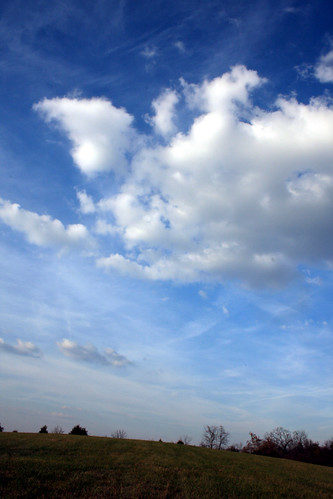
Layers of clouds over Kentucky sky.
(*photo credit)
August 16, 2011
Confronting Misuse of the Air Commons
Everything is connected to everything else. Barry Commoner's First Law
of Ecology
This series of reflections begins in the most common of the commons: the air we
breathe. We ought to know some of this air has been polluted by others,
and our right to clean air has been violated. We accept partial blame for
damage to the air commons either by what we have done or what we have failed to
do.
The
fragile air commons (a res nullius) cannot be bounded, subdivided, or
measured out to users, but it can be damaged by specific polluters through
exploitative infringement on the air commons. As social beings, we realize
that fresh air belongs to all of us, for air and water on this planet are
connected and absolutely necessary for survival. Likewise we know that
fragile nascent human life or "being born" requires human protective measures
and responsibility. The life of this planet is fragile as well, and we are
able to threaten that life by misuse of our air. Seeing our world as "one
great act of giving birth" (Rom.8:22) requires us to become pro-life, and to
champion the
entire web of life; we must accept responsibility for this fragile
living-but-threatened planet.
Our ancestors did not know human beings have the power to threaten all planetary
life. With time, we have become more aware of what we can do for good or
evil. Those with social concerns are becoming more aware of the unsettling
current situation where combusting fossil fuel is leading to a catastrophe, a
situation of profound climate change. Are we responding? Some who
pollute the air, (along with legislative partisans), deny that human beings
contribute to this emerging condition. Our citizen responsibility calls us
to say "no" to fossil fuels and "yes" to renewable energy substitutes. Are
we willing to accept blame for what goes wrong in our world, or do we like to
assign blame outside of ourselves to an imperfect world of others? Even if
I do not willfully dirty the air, do I do my part in accepting the blame of
allowing this condition to exist and endure at this time? This
responsibility on the part of the human family, of which I am a member, bears
heavily upon us all at this time.
Two
aspects of misuse of all the commons are uncovered -- the relinquishment of
proper treatment of the commons by all of us, and the corrective actions each of
us must undertake. Some of us are active people and can take political
actions; others are
handicapped by limits to
expression, or lack of energy due to health or age problems. Either our
mistreatment of resources or our failure to confront maltreatment are harmful.
On the contrary, we can see ourselves as a body capable of collective action to
right the wrongs that have been committed.
Prayer:
Lord, guide us to reflect on what constitutes a vital environment, and how we
can become environmentally concerned.
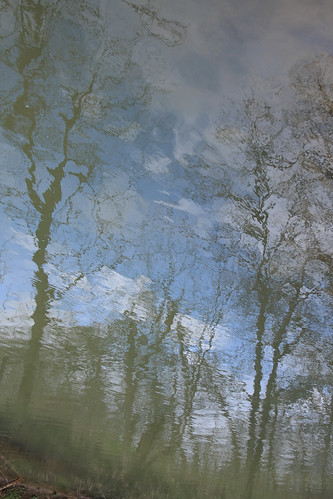
Reflections in a rural Kentucky creek.
(*photo credit)
August 17, 2011
Fighting to Keep Water Supplies Accessible
Arrogance
and gratitude mix like fire and water. The current efforts to take our
water resource by all sorts of privateers invites actions by commoners, who
regard water as a free God-given gift. Water is essential for life on this
blue-green planet covered with much water, most of which is not potable.
In areas where higher quality drinking water is scarce, the temptation is to
privatize this resource. For instance, near Sitka in sparsely settled
Alaska, Blue Lake holds billions of gallons of water so pure it needs no
treatment. The temptation to privatize and ship this water to Mumbai,
India is immense; in fact, one Alaskan company has acquired rights to ship
3 billion gallons of this water annually from Alaska to India.
Transferring supplies are not as bothersome as transferring water rights
to privateers. By 2040, the UN predicts that fresh water demands will
outstrip supplies by 30%. Free marketers talk about rising prices and thus
bringing supply and demand into balance -- but water prices will go to the
highest bidder, not the poor who are thirsty. Callous privateers see water
to be as valuable as oil, and the plan to go with what the market will bear --
and that means primarily to private water and soft drink bottlers. Profits
do not favor environmental protection or human rights, only big suppliers and
big distributors. According to the World Bank, investment is going strong
right now with water supply markets rising rapidly. Some water-rich lands
like Russia and Canada will benefit, and some water-poor desert nations may
perhaps fight over distribution of potentially-shared water supplies.
China
and India are having potable water shortages and, as water systems are
privatized, fewer who thirst at the poorer end have access to essential water.
In America, a number of cities with infrastructure water treatment and supply
problems are thinking about going private, and yet others have had their fill of
private operators. Some point out that competition is limited to bidding
and then the privateer with the contract virtually can monopolize the supply and
market. These privateers can reduce a labor force, neglect water
conservation, and shift environmental concerns back to the public sector.
Water
is free; delivery from its supply source may not be; nor is monitoring endpoint
water use. As supplies dwindle and demand holds steady or rises, water
will get more expensive. Profits ought not to be part of the picture, and
privateers who care little about future infrastructure ought not be involved.
Nor ought rising prices be the prime incentive for water conservation, for here
the poor suffer most. Monitoring water delivery systems is difficult because
piping is underground and not easily checked; the private water people are
enticed to cut corners in quality control. Water as commons ought to remain
public.
Prayer:
Lord, show us the needs of those who are thirsty in this world, and help us give
them water to drink.

Eastern black swallowtail, Papilio polyxenes.
(*photo credit)
August 18, 2011
Limiting Private Property Managed by Good Stewards
Proper
land use baffles all of us, since some land is unused, some underused, some
overused, and some ought to be made off limited for human use altogether.
Ideally, the public ought to monitor, allot, and requisition lands for the
common good, for private individuals are caretakers for a limited period, and
can so often regard the land as theirs to use or misuse in an absolute
autocratic manner. So ingrained is this way of using land, that its
commons characteristics are so often neglected.
Land
is tangible, definable and able to be delineated. Sedentary people were
quick to define what nomads often regarded as open common space. Private
holdings are possible and often needed for food production and residential
lodging. Land misuse includes an atmosphere of absolute control over
acquiring, retaining, and using land -- an attitude fraught with absolutist
cultural traditions, which must be totally corrected. Proper land use in
this world of limited productive land must be reclaimed by acts of good communal
stewardship. Thus proper land use is a shared responsibility of all
people, not just individualized stewardship of title-holders. Misuse of
land is evident: erosion through overgrazing and improper agricultural and
mining practices; enclosure of large amounts of land for private
interests; unplanned development and urbanization; and failure to reclaim
damaged land.
Right to
common land clashes with right to private property. An enhanced sense of
global land needs limits amounts of privately- controlled land. Forests,
wilderness, watersheds, and scarce food-producing areas are essential as
commons, not as self-proclaimed private landholding privilege.
Historically, land titles were liberally dispensed to colonists, homesteaders,
and railroad companies. However, an evolving concept of commons makes our
local community a global neighborhood -- and redistribution becomes a communal
stewardship issue and project. Since individuals often lack experience and
resources to reclaim land, limits to private land use privileges are needed
today. A "commons sense" leads to communally-defined landholding limits
and proper land use.
Affirming that we ought to work towards less privatization and more public land
seems to fly in the face of patriotic American concepts. First, leases to
public lands ought to be time-sensitive, and such lands revert to the public
domain. Secondly, the areas in extensive private control when well managed
ought to become the public domain, with current holders allowed to continue but
again renewable in a reasonable time limit such as ten years. Jubilee
Years ought to be declared on all wealth including land. This Jubilee could
be regulated fairly through special taxation on surplus properties and wealth --
so that redistribution can take place for Common Good.
Prayer:
Lord, open our eyes to see all land as Holy Land, redeemed in the price of the
blood of Christ and the sweat of those joining in the noble enterprise of the
Body of Christ.

Weeding and enjoying deptford pink (Dianthus armeria) in the garden.
(*photo credit)
August 19, 2011
Contrasting the Material and Spiritual Culture
We
live in a world in which we need to show that the material motivation of
profit-making for wealth on an individual basis is a weakness; taken in excess
this could destroy our world. On the other hand the profits or benefits of
a spiritual nature must be promoted; these benefits should go to all
people especially to the poor and destitute. The secular society in which
we are immersed makes attaining and retaining money the only reality; this must
be confronted and changed to spiritual profit-making.
Material Culture
Spiritual Culture
Obtaining
for self Sharing with
others
is goal
for the common Good
Greed
is a virtue Doing
justice for all
worth promoting
must be promoted
Power
over others Power
with others
Corporations
are persons Corporations are creatures
with "rights"
of the state
Affluent
consumers Sharing
essentials with
drive the economy needy drives
the economy
to fulfill wants
to fulfill needs
Wealth
will trickle down Wealth must be regulated
Material
profit motivates Establishing justice motivates
Free
market is self- Market is only fair if
correcting
regulated
Superrich are to be Superrich
ought to be liberated
models of virtue
from their own excesses
No more
taxes
More fair taxes
More
private property Limited property for all,
with few restrictions no
large estates
Privatize utilities
Retain public utilities
Unlimited
salaries Limited salaries
retained
after taxes
Less
Government
More monitored government at
at higher levels
all levels
Prayer:
Lord, awaken in us an awareness of the cultural differences in our world;
do not allow a dysfunctional materialistic culture to distract us from seeking
justice.

Late summer aster.
(*photo credit)
August 20, 2011
Recognizing World Health As Global Security
A
healthy world is our dream, and this can be a possibility -- though we know the
great toll of human illness. Sick African children and those of all ages
with easily preventable and curable illnesses threaten the security of our
world. The best medicine and treatments in the West and North should be
available in the South and East, or otherwise a grave disparity exists.
Untreated and easily preventable sicknesses not only result in human suffering,
but the conditions actually destabilize communities local and beyond. We
affirm that access to health facilities is a human right for all, and not just
that of a privileged few. Translating right action has a practical side.
We speak of rationing, a godsend for the poor and restrictions on the wealthy.
Rationing
as minimum involves being inclusive as best we can with available health
resources, especially services found in clinics that come at low cost. Our
attention turns to primary health care: pre-natal care, universal vaccination
for common diseases, hydration for those suffering from dysentery, protection
from malaria (mosquito netting), basic medicines for preventable diseases, and
supplements for the malnourished. The World Health Organization (WHO) is
already running many programs costing as low as a few dollars per person per
year. Expanding these programs globally would only take a fraction of the
global military budget -- and diversion to universal health is a low-cost
security issue.
Rationing
as maximum involves choices of all forms of elective treatments and new
medicines for patients with a range of degrees of sickness, age, and condition.
Are these services available for the very poor in Haiti and parts of Africa?
The irony is that some of these developing lands have more native-born health
personnel working in North American and European health facilities than in their
own impoverished countries. Paying expatriates to return to their
homelands and serve their own is one possibility.
Insecurity
of all forms threatens the social order, especially when victims know others
have better access, whether fortunate people in the local community or beyond.
Health-care rationing occurs on battlefields as "triage," or dividing victims
into degrees of effective care, namely, those critically in need of treatment
and possible surviving with immediate attention, those in between and requiring
longer-term attention at moderate cost, and those too far gone to benefit from
receiving immediate attention. Battlefield situations exist. Global
health triage could be based on success possibilities, patient's age, current
health situation, along with responsibilities of the patient -- and costs.
The world's military is often directed to costly natural or human-caused
disasters where it does a credible job. Military-to-health-care funds
would become a peace and security dividend; these should be a diversion of money
from military to health facility budgets.
Prayer:
Lord, grant us the willingness to convert swords into medical facilities and to
expand universal health care to all.

Caterpillar of the monarch butterfly, Danaus plexippus.
(*photo credit)
August 21, 2011
Rattling the Keys of the Kingdom
I
will give you the keys of the kingdom of heaven; whatever you bind on
earth will be considered bound in heaven. (Matt. 16:19)
The
words of Jesus are still as astounding today as when he spoke them two thousand
years ago. Do real powers come down from heaven and reside with mere
imperfect human beings? Are human beings worthy of that power? As a
believer I respond that the first answer is "yes" and the second is "no."
The
power to do something of a divine character is hard for us to fathom at first.
But Christ came among us and invited us through baptism into the divine family.
We join with the resurrected Lord who commissions us to do things far beyond our
own imagining. The powers he mentions are truly immense -- driving out
devils, speaking in tongues, giving up one's life for the Gospel, curing the ill
and on and on. We enter in various ways into this movement to save others
and even Earth herself. These powers are not symbolic or allegorical, but
are real and actual. In God's name we can act -- but we must be people of
faith, for empowerment, spiritual trust, and faith go together.
Yes, the
power that we believe has been transferred through the Apostles involves
forgiveness of sin. The keys rest in God's mercy. We want to hear
from another that we are forgiven in a personal, touching manner. We want
to be told that what we are craving in our hearts is right, that we are on the
right road, and that we are encouraged to continue. The key is in the hand
of the Almighty and it passes on to human beings through the power of the risen
Lord. As ordained, we believe that we hold the awesome key in a special
way, and that we help make this key operative along with the unordained.
Belief in these powers is needed for the key to operate and have its effect
within the world community.
No,
those of us who receive these powers are never worthy. We can approach
worthiness over time and with effort, but the power given is bestowed even
though we are called but unworthy. We do not first become worthy and then
get power. To the unworthy, God gives power -- and this includes the power
to save our wounded Earth. We can see this power, believe that we must use
it responsibly, and act accordingly. A study of church history may trigger
critics to name bad popes or irresponsible actions on the part of church leaders
or followers. We acknowledge a human church has acted accordingly.
But we can't forget that no other small group of 264 persons (the number of
popes from Peter to now) has had so many recognized saints (over 100) who
responded generously to the invitation to exercise certain powers. All
believers share in power to some degree, not because they are deserving, but
because they are called in this particular time and place.
Prayer: Lord, move us to see that keys to the Kingdom include our
calling to heal and help re-create our wounded Earth, and to see this as a
sacred calling.

The Mourning Dove (Zenaida macroura).
"The Golden Eagle soars to the heavens to go to the Light."
* Photo by Sally Ramsdell, who passed away on the morning of August 22, 2011.August 22, 2011
Radicalizing People to be Change Agents
To
radicalize another is to take a big risk. In some ways it is similar to
making them responsible people for saving our wounded Earth. To radicalize
is to make believers penetrate to the causes of today's woes. Some do not
want to; some are cynical; some are afraid that it may cause others to object;
and some are lacking in faith.
We
each need hope while we engage in becoming more radicalized. The
conclusions of radicals may be the same demand for fairness for all people, and
yet getting there may take a violent direction by some, especially those who do
not regard property damage, destruction, or seizure as a part of the violence
stage, only actions that harm people -- or animals. Thus radicals may be
drawn to abrupt turns and actions on their paths to justice, but it demands
reflection prior to action. To act against another's interest invites.
We know that reaction comes with any property damage, and misunderstood reaction
could hurt a cause.
Becoming
known as radical could result in being marginalized and the message is lost amid
emotional words. With the Internet, a position can be widely known without
being accepted or it may become accepted over time. We have a gradual
educational process in which people hear about something and begin to accept it
at stages, thus unknowingly becoming radicalized as an educational process.
A teacher cannot beat education into a person but must have a patience that
others find irritating. Radicalization is an educational process, and
change agents need to be good teachers, not violent in any practice including
their teaching methods.
The
topic of reclaiming the commons is not on everyone's lips, and in fact it
appears to be on few agendas because of the remoteness, lack of understanding,
current popularity of material profit-making, and an atmosphere of trivia that
crowds out any type of serious reflection. The absence of needed
discussion does not mean it ought to remain hidden. The place and time is
right. What emerges in our reclaiming of the commons is to counter air,
water, and land infringement as well as to preserve our past treasures, to
proclaim our future wellbeing, and to enliven the present moment.
How
do we persuade others to enter into the fray? How do we get them to see
the situation, to want their own offspring to be better off, and to see that
their efforts are part of a total global effort? The chatter of Twitter and
Facebook and cell phone interchanges can be contributive if properly placed and
well received. However, we must remind ourselves that our generation has
been addicted to the consumer culture. The task of persuading others is
daunting but this calls all the more for us truly to believe that we can make a
difference, and that success can occur.
Prayer:
Lord, mold our patience to see that changes may come about in imperceptible ways
while we live and with greater success after we are gone.

Intricate patterns in the poppy flower.
(*photo credit)
August 23, 2011
Balancing Sounds and Silence
The
challenge listed here is not to the worth of various sounds or the rests and
spans of silence that must appear in harmony for every person. Rather, we
direct attention to something far more problematic: how do we balance the
sounds and silence of one person with others in a household or a community?
We can live with the stress of noise or with oppressive isolation of silence?
Are we able to find a balance of sound and silence at times and places?
Are we people of compromise in order that all might live in relative peace?
The questions are simple enough; the solutions are not.
The
right to silent space/time often conflicts with those seeking to enjoy
themselves with laughter, song and animated conversation. A higher quality
of life needs to have a harmony of sounds and silence, not one to the detriment
of some and the perfect satisfaction of others. Creating a communal
balance requires compromises. Merely objecting to excessive sound does not
create a more enduring condition where some can talk and sing and celebrate and
others can sleep and rest.
Success
consists of compromise with making, avoiding, and suppressing sound so that all
are willing to accept results. The community balancing process includes
starting local educational programs, fact-finding using noise meters, listening
to the demands of those with delicate auditory senses, encouraging proper rest
time, and allowing a certain amount of celebratory activity in given places at
specific times. If we seek to compromise and balance sounds and silence at
the local level, we grow in the confidence that we can reclaim a broader
commons. The best defense is a good offense: confronting conflicts of
self-interest (insensitive noise-making or extraordinary demands for silence)
requires open and listening change agents who work with all parties for the
Common Good.
Compromises
require public participation, not through a fiat on the part of one or other
authority. All parties ought to see the need for the other. We need
to sound off about our sounds/silence balances, and to ensure that all
see wisdom in allowing others to make sounds or to rest in peace.
Certainly there ought to be a time and place for both. We need to
adhere to steps taken and not deviate from what is accepted in the body of
the compromise. Noise can so easily occur that breaking rules of this sort
is quite easy. Third, we ought to
apologize when rules are broken, in order to keep all parties somewhat
happy. Yes, even in this congested and noisy world we can learn to live
together quite well, and to do so in a Dutch manner of respectful sound and
silence, a learned and participative experience.
Prayer:
Lord, render to us the gift to make sound and the patience to keep silence, and
help some to celebrate and others get their needed rest all in their proper
places and times.

Ladybird beetle in tangle of lush vines.
(*photo credit)
August 24, 2011
Taxing the Rich For God's and Our Sake
The privileges
allowed to the rich to retain their wealth that is a commons for the good of all
must be challenged in this age of growing destitution. Benefits accruing
from taxing wealth include:
*
Personal benefits accrue through a better understanding of democratic
process by participating people; these are encouraged to distribute wealth to
those in need. Blindness by the affluent results in misunderstanding of
the essential needs of the poor. Solidarity could accrue with the hungry,
thirsty, and homeless who are satisfied through redistribution of resources,
thus relieving the dehumanizing conditions of poverty.
*
Local economies could provide affordable housing and small farms could
use local labor and resources, enhancing the economy. The reduced wealth
of individuals would allow for a reevaluation of what it means to make a profit.
Motivation would be purified to where "profits" could be transformed from a
materialistic to a spiritual set of goals.
*
Regional area development will come when funds are available through fair
taxation. Enhanced democratic selection of candidates and elected
representatives will result in limits on campaign spending. With proper
funding, health and educational facilities and programs would be expanded to
cover basic needs of all people and not just those of the privileged few.
*
National targets include resource conservation and efficiency programs
along with lower-priced and well-selected renewable energy alternatives.
National goals of employment opportunities will be met through infusion of funds
for rebuilding infrastructures (roadways, irrigation projects, fast speed
railways, park areas, and food and water storage systems).
*
International cooperation is needed at every level of protection of the
commons (air and space, water protection and distribution, maritime travel and
safety, wilderness and fragile areas, access to health and educational
facilities, compromises on areas and times of sounds and silence, and movement
of goods and people). Through fair and sufficient taxes, existing programs
could be expanded to cover these areas of need.
*
Global security could be enhanced with more funding coming to people who
are unemployed and those who are hungry. Tensions are allayed through
reduction in disparity in wealth, and the tensions associated with those
striving to become superrich are reduced. Reduced military expenditures
should shift more problem resolution to diplomatic and financial arenas, and
military groups and the weapons industry to peacetime pursuits.
Prayer:
Lord, inspire us to look out and see all who are in need, and to resolve to
do something about it through redistribution of world resources in a non-violent
manner.
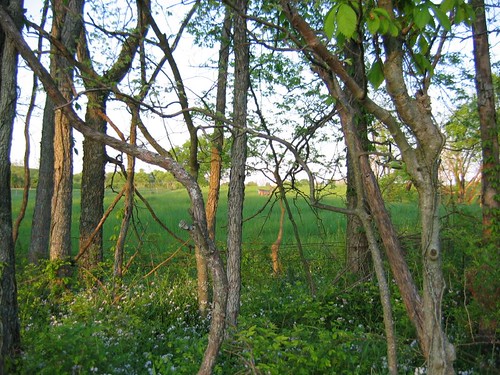
Scene from evening at Buckley Wildlife Sanctuary, Kentucky.
(*photo credit)
August 25, 2011
Becoming Prophetic Reclaimers of the Commons
Paralysis, not free movement, dominates the public scene. Tranquility
ensues when the public becomes so enamored by materialistic excess that
commercials block out objections. Where are the believers called to be
prophetic? Remaining silent in the face of materialism is a partisan act,
an act of idolatry, a failure that reduces us to slavery. To act or not to
act is the question, and religious institutions must look into themselves.
Why ignore those lacking essentials of life? Why should 1,000 billionaires
control wealth when one billion people go hungry?
Silence
permeates business, educational, health, and even church circles. Are
civic and church leaders expected to be court chaplains to the rich?
Established systems, whether secular or religious are often dependent on the
traditional economic and political systems to survive. Public critique of
the existing political system brings disapproval, and a certain covert "red
lining" of criticizing institutions or individuals. Who dares to lock
horns with loyal supporters and donors who are dutiful promoters of the state
religion of money? Excessive wealth remains overlooked in some
religious communities, for that is the hand that feeds those institutions into a
respectful silent state.
Today,
within our culture, it is unpatriotic to frustrate the wheels of consumption.
Do we forget that self-denial is a virtue that is practiced according to
religious tradition (Advent, Lent, Ember Days, Ramadan, Yom Kippur, etc.)?
We may agree to self-denial in principle, e.g., saying "no" to drugs.
Religious-sponsored educational and charitable institutions have generally
started quite small and with degrees of freedom to act. As they age, they
prosper, take on larger commitments, maintain more involved physical facilities
-- and gradually lose their freedom to speak or act prophetically. Thus
occurs over time a gradual almost unnoticed toning down of justice-related
issues. We strive to be dutiful stewards of the gifts that keep the
institutions visible, e.g., the Roman Emperor Constantine's legalization of
church structures.
Silence
mutes prophetic voices and reduces private institutions to healing, relief, and
teaching -- but never being critical of the system in all its unsustainability
and unfairness. Even though numerically weak (one-tenth of the population)
in the 1770s, churches played an important role in the first American
Revolution. Today the majority identifies as religious believers of some
sort, and yet prophetic voices are muted in business, political, and even
religious programs. Where are prophetic voices? Critical evaluation
of materialistic ads could become game play by creating anti-commercials to
counter deliberately misleading ads, to counter consumer impulse-buying, and to
initiate serious questioning of the system.
Prayer:
Lord, call us to be prophetic and to never lose heart when others seek to
tone us down.
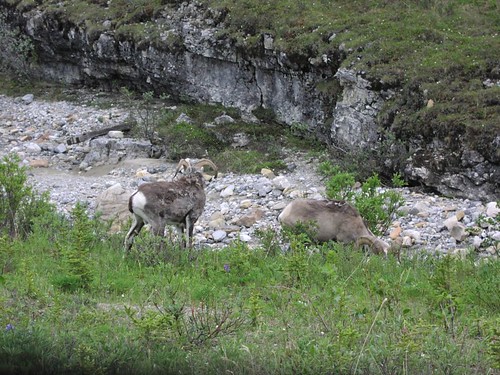
Stone sheep in northwest Alberta, Canada.
(*photo credit)
August 26, 2011
Revealing Elements Needed to Reclaim the Commons
We need
to designate and coordinate several elements related to the various parts of a
system that is dysfunctional and unsustainable.
Air:
Accepting that Climate Change is of human causation. This involves
seeing ourselves as partly to blame for the damage done to our wounded planet.
Water:
Taking essential water supplies as needed. Water is part of the
commons and privatization of water resources is a heinous crime against
humanity.
Land:
Making public large private estates. The world is in need of land
to grow crops and to furnish housing for people; fragile lands can be damaged by
privatization; wilderness must be preserved for wildlife habitat and flyways.
Culture:
Challenging a materialistic profit motivation. A spiritual
understanding of culture honors the richness of past peoples and even primitive
cultures. These treasures including endangered languages must be preserved
for the benefit of all.
Health
facilities: Demanding basic health access for all people.
To counter the argument that universal health is too expensive, we ought to
regard this is proper investment in the future. The West fails to see that
health care as part of global security, and thus the massive military budgets
should be diverted to universal health access.
Intellectual:
Promoting the concept of reclaiming the commons. Intellectual understanding
of the concept and publicizing this to the world is a major challenge that takes
creative use of available Internet and other global communication resources.
Silent
space: Balancing the need for rest and public expression.
Silence has a place and so does making proper sound. We need to give each
its proper respect and to do so through community involvement.
Movement
of goods: Redistributing wealth to a world in need. The process
of imposing fair taxes on all, and not just on portions of society with less
power to resist, is at the heart of a movement that questions "no new taxes."
Rather acclaim, "only fair taxes."
Movement
of people: Defending the right of people to move. We
must defend the free movement of workers, refugees, the oppressed, and those
wishing to travel from place to place.
Prayer:
Lord, enlighten us to see that many elements must work together for the
betterment of the social order -- and to have the courage to openly promote
these elements.

Prairie dog (Cynomys), North Dakota.
(*photo credit)
August 27, 2011
Promoting World Federalism to Save Our Earth
We
need authors of a new set of Federalist Papers, except the motivation
must not be trade, commerce and material profits, but rather on sharing the
commons. A set of Global Federalist Papers needs to be based on
sharing essential goods and the promotion of spiritual profits. Unless we
do this and do it rapidly, the world will divide into warring factions of gated
communities and roving and starving masses of people unable to live in inundated
coastlands. The scenario of an unequal world is so frightening that we do
not wish this on our future generations -- and yet this is a possible prospect
unless we change our ways.
A
world federalist community of nations is the only answer. However, just as
the Articles of Confederation were not suitable to sustain our collection of
colonies-turned-states in the immediate post-Revolutionary War period, so today
the United Nations in its current format is unable to meet the needs of the poor
and lower-income people of our Earth, nor the threatened and endangered species
of plants and animals that are among us.
Lack
of willingness can hold us back. Needs are imperative and these needs
drive people who are committed to be merciful in their dealings with others to
ACTION. The lack of will has much to do with affluence, addiction, and an
insensitivity to being able to change our ways.
Lack
of funds can hold us back. This may seem somewhat beside the point but
it isn't when conceiving of health and educational access. Yes, we are
addicted to consumer products, and we are unwilling to act on social issues.
A lack of public funds is becoming evident when it comes to general employment
and rebuilding the infrastructure (roads, bridges, etc.) of our land.
Enough people have private funding; not enough have the public funding
that could be meaningful in fighting poverty at all levels. Establishing a
ready source of global funding is at the heart of the problem facing world
federalization.
Lack
of a sense of urgency can hold us back. I realize that the movement
has been a political one for decades, and yet who is to plant a seed that is to
grow? With the Internet we could achieve this rapidly in some fashion for
the good of all. We must understand the impact of food insecurity on
millions on this Earth; the hungry cannot wait; neither can a threatened Earth.
Lack
of inspiration holds us back. We have to inspire a world and draw
attention. We are confused by many actors on the stage of life and an
information overload. Our tone must be convincing and our message must
penetrate the walls of distraction and trivia. We need to have a sense of
the right place, right time, and a charism to touch the hearts of others.
Prayer:
Lord, direct us to find the right approach. Inspire us to make corrections, to
avoid ruts, and to keep to the road.
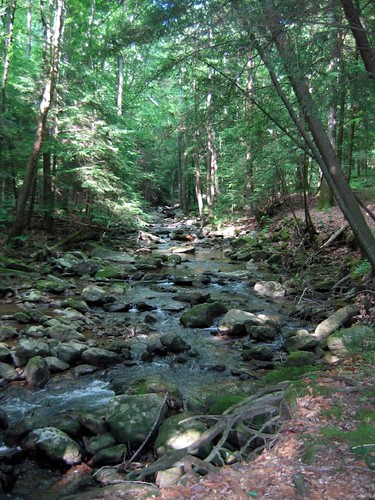
Appalachian stream in August, eastern Tennessee.
(*photo credit)
August 28, 2011
Denying Self to Follow the Lord
Self-denial
is part of a balanced person's life and a part of the proper practice of
believers. We sometimes observe others who are over-indulgent -- in drugs,
alcohol, gambling, computer games, etc., -- and know there is something wrong
without judging them. However, we become aware that a better course must
be pursued and that is a must. We overlook the fact that individually we
can be immersed in excessive ways and must fight to avoid them.
Limiting substance intake
-- We cannot eat too much so we take smaller portions or refrain from the
dessert even though all looks so good, a denying of too much of a good thing.
Saying only so much -- We have to say something about what appears a bad
family or community practice, and we are asked to give an opinion. While
wanting to say much, we hold up and put off the reply until we calm down,
denying a chance to speak our mind.
Knowing
what can hurt us -- We will refrain from tobacco, alcohol, drugs (even
prescribed ones) by an understanding that use can be addictive, and our will
power is weak.
Accepting
our past -- Our self-denial includes our failure to come to terms with what
has gone before. We deny that the Lord forgives and desires that we accept
his mercy, and thus we deny our spiritual gifts and the opportunities to move
forward.
Realizing
our future -- Too often we say we want to do this or that (e.g., learn a
language, become a wood carver, etc.), and lack determination, time, or talent
to initiate the preparation to remake a better future.
Confront
the present moment -- Lack of self-denial leads to false living and focusing
on allurements that can distract us from doing what we ought. Through
self-denial we can gain a sense of social involvement, something needed
desperately at this time.
Needing
to worship with others -- Sometimes we fool ourselves into thinking that we
are too sick, or too tired, or too depressed to join others. It is wrong
when we entertain a series of excuses that hold us back from true communion with
others.
Looking
out for others -- We need to be attentive to self needs but not overly
attentive. Even those who commit themselves to living properly often
overlook those immediately around them. A call to be with others is a
denial of excessive self-attention.
Thinking
of the world's destitute -- Self-denial opens the door to knowing that
others are in worse shape than our local community, and deserve urgent attention
at the global level.
Prayer:
Lord, help us to deny ourselves for the good of all.
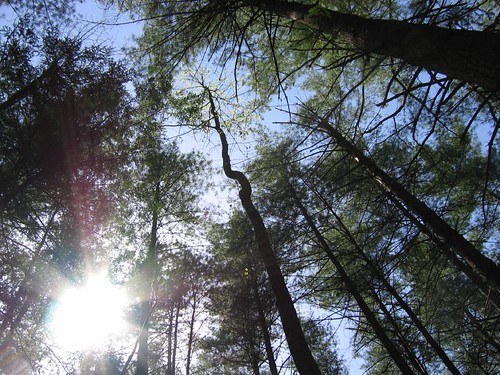
Through the treetops: a pine grove in Red River Gorge, Kentucky.
(*photo credit)
August 29, 2011
Realizing That We Are Both Powerless and Powerful
Our
power as people of faith could be looked at two ways: first, we are
gifted people with the power to change the world; second, we are
weak people unable to do anything on our own and depending on the grace of God
to empower us. To focus on the first exclusively could lead to pride or
unrealistic goals of which we soon fail; to focus on the second could
allow us to succumb to capitalistic propaganda telling those who have a right to
resources that they are too powerless to change the system -- they need that
signal of privilege from God. Neither statement in itself can stand alone:
we have power, but we are powerless individually.
The
strange thing about these two statements is that while they appear at face value
to be contradictory, both are true in describing what people of faith are called
to be and do. In our potential deeds, we are enabled to change the world
-- by the grace of God. Our powerless condition, as human beings filled
with imperfections of which each of us is all-the-more familiar, only becoming
spiritually empowered when fully understanding what we have been given -- a
power to do great things with others. As individuals, we are aware we can
do little; by working in a grace-filled body we can transform a hopeless world.
The power of faith to move mountains rests in some God-awful way within us, and
this brings us to our knees, not to a swelling of our heads. Our power
does not come from within us, though at times people's egotism takes the better
of them, and they deceive themselves for some short period of mortal life by
false pretensions.
Let's
ask the basic question: If we have power amid our own powerlessness, where does
it come from? The answer must only be that God is the source, though this
can be expressed in the communal activity of mutual support within a God-fearing
community of faith. Furthermore, we know from Scripture that God works
with the poor, so that the divine almighty power is manifested in them.
God works with weak human beings in the heart of their own poverty, and, in our
belief in this divine power, we can achieve great things. We are
empowered, but we must believe we are.
Each
day we must say, "Lord, I am weak." This confessing of weakness cannot
stop there, for some could see this as the temptation to do little and be
excused from deeds that can make a great difference. The devil is at work
in such circumstances, for we can easily become immersed in self-doubt and
excuse. The basic response is that "In the Lord I am strong." This
first is a confession; next it is an utterance of praise; recognizing the two
simultaneously elicit an act of thanksgiving.
Prayer:
Lord, you know our weaknesses. Help us in this age of potential change to
know the power you have given us, sincerely to see you as seat of power, and to
manifest your glory in showing the world that profound change can and will occur
in your name among the poor. Help us to be both in their (the poor) midst and in
your company and thus be empowered to do great things.

Counting the warts on Fowler's Toad (Bufo fowleri).
(*photo credit)
August 30, 2011
Proclaiming the Good News to All Creation
Go
out to all the world and proclaim the Good News to all creation....
(Mark 16:16)
This
passage is only part of a total Gospel of St. Mark and we should not focus
overly on a single phrase, except that this is a summary statement of the entire
Gospel; this tells a story in itself, the story of our Messiah
transferring a mission from himself to all of us working with him. We have
two aspects of this verse -- to go out to all the world in our own way; to
spread the Good News to all creation. How do we do this?
Going
out may be literally a departure to a distant place, but it means primarily
departing from the current status quo or mindset that we have and embracing in
thought, compassion, and hope an entire world that acts like wandering sheep
without a leader.
Proclaiming
may mean to do so literally by preaching on a street corner, or it may mean
proclaiming with our lives what the Good News is all about. We must be
public, for that is an act of commitment to the Lord who came among us to save
us.
Good
News is the word that the Lord is with us and we have the gift of hearing
and responding. In our response we see that God gave us great gifts that
are worth sharing, and part of the mission is that, in an atmosphere of
gratitude, we respond.
1.
All creation is in some way the hardest of these concepts to comprehend.
We may shout and speak to plants and animals for they are part of all creation.
In one way, we need not be so expressive, for some might think we need to be
committed for mental treatment. However, the joy of meeting creatures is
creation-centered in some way and here we can show joy to companions.
2.
All creation is in need of protection and so we are called by the Lord to
have sympathy with the sorrow and suffering of others, and the threats and
endangerment of all creatures. We are to protect the charges we have in a
redemption-centered manner and not exploit them. We bear an awesome
responsibility.
3.
All creation is in need of respect and enters into a growth that can come in
knowing the creature in a deeper and more spiritual manner, and to enter into a
deeper position of newness of life. We raise our eyes and look up to
creatures as sources of life and Good News in themselves as part of the chain of
being. In this regard, resurrection-centered new life is worth
celebrating. This is truly Good News, and this is worth our proclamation.
Prayer:
Lord, energize us to go forth and proclaim Good News and to do so while
listening to the story of creation being told to us. Help us to see our
mismanagement, correct it, and make the world a better place through cooperative
efforts involving all.

Family farm near Bardstown, KY.
(*photo credit)
August 31, 2011
Rereading Upturned Plow
The following is my first and only poem I ever received any recognition in my
life of scattered and random poems -- and so I thought after 63 years it would
be good to share with my readership.
Upturned Plow
While
rabbit hunting, we happened to stumble upon
An old forsaken plow, half hidden amid the briers;
Handles, paint-peeled and rotted,
Protruded like a dead calf bloated in the summer sun.
Rough handles worn smooth by smooth hands turned rough
While pleading a livelihood from rocky soil.
That
blade lay partly buried in the gully clay,
Rust-covered,
mud-covered, frost-covered,
Coatings, which that sword-beaten share never knew,
When little kids stooped and grinned
to see their faces on its clean used surface.
Colters,
skimmers, prairie breakers,
Crooked
sticks, wood, bronze, iron, steel plows --
All had brute animal flesh before and human flesh behind,
Who spent the warm spring daylight hours
In raising and turning a dark brown ribbon of sod.
For
crude and toilsome though that labor was,
The one who guided stood master of his course;
And his pleasure seemed to be the art
Of drawing plants from sweat-soaked soil.
So-called
poets write of those with hoes,
Who
in the drudgery of their work
Saw only despair,
Who
beat sun-hardened clods from dawn to dusk
And never lived but to some
day
Be settled in some nameless urban slum.
Write
instead, poets, of the killdeer
Running across the fresh-plowed field,
With
its plaintive, piercing cry;
Or
of the cowbird hovering around the straining team
Just
to snatch the uncovered earth worm.
Write
of the farmer calling to the team ahead --
"Gee," "haw," "whoa."
Speak
of the drawling, fortunate country folk
Whose
words were living testimony to slow lives,
The
way of people with time to live and talk.
These
farm people could pray for rain or sun,
Or trust that God would keep the frost away,
Or
ask for winds to dry and showers to moisten,
Never satisfied but always trusting and pleading.
Old
toilers with battered hats and leather skin,
Stubborn,
free, proud, wiry race;
Who
would make you leave your soil?
Who
would ever bury you but in your blessed earth?
Landholders,
your fields are wanted by thousands:
By
business people, developers, politicians,
Wealthy with new wealth.
Your
small farms are gone and in their place
Are
large estates of gas-fed and wet-back slaves.
Tillers, your chestnut Belgians have long since died
And
never left sired offspring in their passing.
Now crawls a grunting tractor hungry for gas
--
Destroyer
of ten millennia of ox and camel and horse.
Settlers,
your offspring have left their homes.
Did
it crush you the day you tried to stop them
And
found the reasons the farmer's life is good
Far
too noble to be expressed by mere words?
Plowers,
freeholders, teamsters, tenants:
Those
plows, those testimonies of toil now tossed away.
Do
you really want us to turn back the clock?
Remember,
you made straight furrows by a steady eye;
We
doubt if you would have us retrace those steps
Or
revive that sweaty art of nameless folks,
Which
had a beauty found in clear-cut fence rows,
And
tall dry barns, and rat-free grain bins.
Thank
God, we still have piles of junk and rusty reapers.
We
are grateful for old stables with hand-hewn beams,
And
gray stone walls, and forgotten rutty roads,
The
last reminders of a hearty strain of people.
On
we hurry, and like grave visitors in the twilight,
We
pause and salute the strong and gallant generation
That
cared to live, and in due time did prepare to die.
--
and we leave that plow rusting on the ground.
Al Fritsch, October, 1958
|